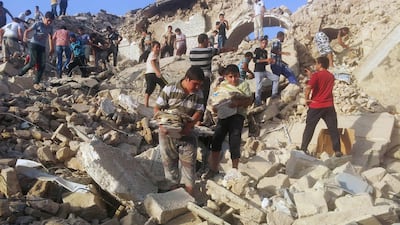MOSUL, IRAQ // When the residents of Nabi Yunus woke for Ramadan prayers one morning in July 2014, they were unaware that a cornerstone of their belief and their identity would be obliterated that day.
But at eight that morning, ISIL militants came to the mosque perched on the hill it shares with the cluster of houses that make up Nabi Yunus and rigged it with explosives. Before detonating the charges, the masked fighters stripped anything of value from the mosque, even taking the air conditioning sets that had kept worshippers cool in the hot Iraqi summer.
They herded the locals from their houses into the streets at the foot of the hill, forcing them to watch as the explosion tore through the Mosque of the Prophet Yunus, where the religious figure revered by the three Abrahamic faiths was said to have been laid to rest.
“The people were crying when it was blown up. It felt like a funeral. Daesh told them not to cry, they said it was the right thing to do,” said Mahmoud Ali, who lives a few metres from the mosque with his family.
Nabi Yunus sits on the edge of the archaeological site of the ancient city of Nineveh, and is a hamlet within the sprawling conurbation of Mosul. For centuries, its history has been intertwined with the mosque, a cherished place of daily worship to its inhabitants.
Before becoming the site of a mosque under the reign of the Uzbek ruler Tamerlane at the end of the 14th century, a church honouring Saint Jonah, as the prophet is known to Christians, stood here. The church was in turn erected on the remains of a palace built by the Assyrian king Sennacherib in 7BC.
The mosque contained what Muslims and Christians believe was the tomb of Jonah. It also held a shrine said to have contained a tooth from the whale that, according to Islamic, Christian and Jewish scripture, carried Jonah inside it for three days.
The families residing in the old stone houses of Nebi Yunis have lived next to the mosque for generations.
Used to praying five times a day inside its walls, they had an intimate connection with the building, and its destruction left a huge void in their community.
“This is a very historical place. When they blew up the mosque they destroyed our history. If someone blew up the Big Ben in London, how would you feel,” Mr Ali said.
ISIL, which inflicted a stunning defeat on Iraqi security forces to take control of the country’s second largest city in June 2014, prevented residents from coming to what remains of the mosque. The Iraqi military launched its campaign to liberate the city last October, and elite Iraqi counterterrorism troops reached Nabi Yunus on January 16.
A handful of insurgents who took up sniper positions in the ruins were dispatched in a short firefight, and the locals were free to return for the first time in more than two years.
On the day of the liberation, despite fears about booby traps the militants might have left behind, the men gathered in the ruins to pray.
Standing atop the rubble of the collapsed roof, the minaret and the walls of the mosque, they surveyed the skeletal remains of archways that once lined the interior, the walls that had remained intact. Green tiles that once covered the roof lay scattered among the fragments of stone ornaments and engravings that had adorned the walls.
Seeing the devastation from up close tore open the wounds inflicted by the mosque’s destruction.
“I wish Daesh had blown up my house instead of the mosque,” said Nabi Yunus resident Meshwan Thanoon.
ISIL believes that the worship of shrines and effigies is idolatrous. It has destroyed tombs, mosques, churches and archaeological sites throughout the areas of Iraq and Syria that fell under its control.
Documenting the destruction in well publicised videos, the extremist group was not beyond bending its own rules for profit.
While antiquities deemed heretic were smashed up by bearded militants on camera, others were secretly sold on the black market to fund ISIL’s war effort. Nabi Yunus residents say they saw ISIL fighters dig below the mosque in the hope of finding remains of Sennacherib’s palace. Two ancient Lamassu statures were unearthed there during Saddam Hussein’s time, according to residents, but were buried again when guarding them became too difficult in the chaotic years after the 2003 US invasion of Iraq.
The ISIL militants failed to find these statues and left empty-handed, residents said.
Nabi Yunus was one of the last neighbourhoods in east Mosul to fall to the Iraqi Special Operations Forces (ISOF) that have done the bulk of the fighting in the city. ISIL has been almost entirely pushed out of eastern Mosul, which is bisected by the Tigris river. The fighting will soon shift across the river to western Mosul, where the insurgents still hold out.
The grounds of the mosque offer a view of the city as it spreads towards the river about a kilometre away. In the car park next to the ruins, a group of ISOF soldiers posed for selfies, flashing victory signs as they grin into their mobile phones. Others scaled the rubble for a better view, and for more dramatic pictures.
These soldiers will soon be deployed to the other side of Tigris to finish off the insurgents and put an end to its so-called caliphate, which was declared by ISIL leader Abu Bakr Al Baghdadi in the Great Mosque in west Mosul.
“Our morale is high. We expect the fight for the western part to be easy,” said one of the men clad in ISOF’s black combat fatigues.
foreign.desk@thenational.ae

